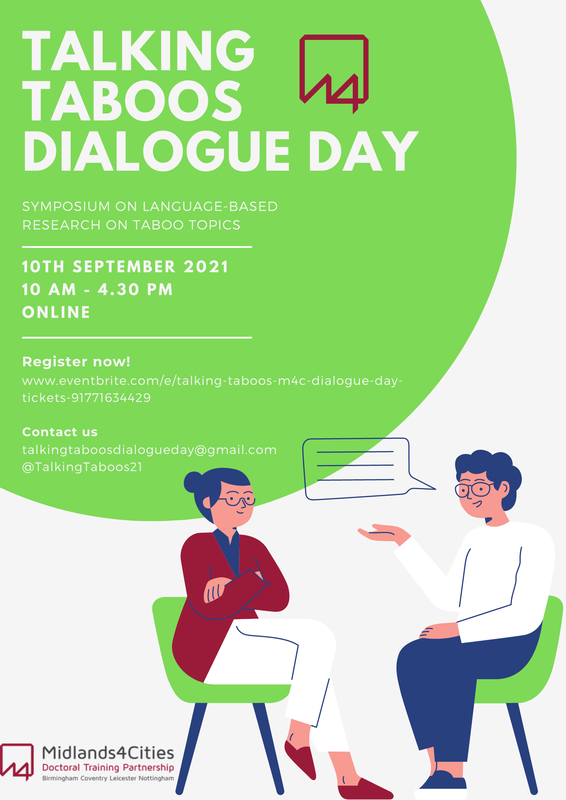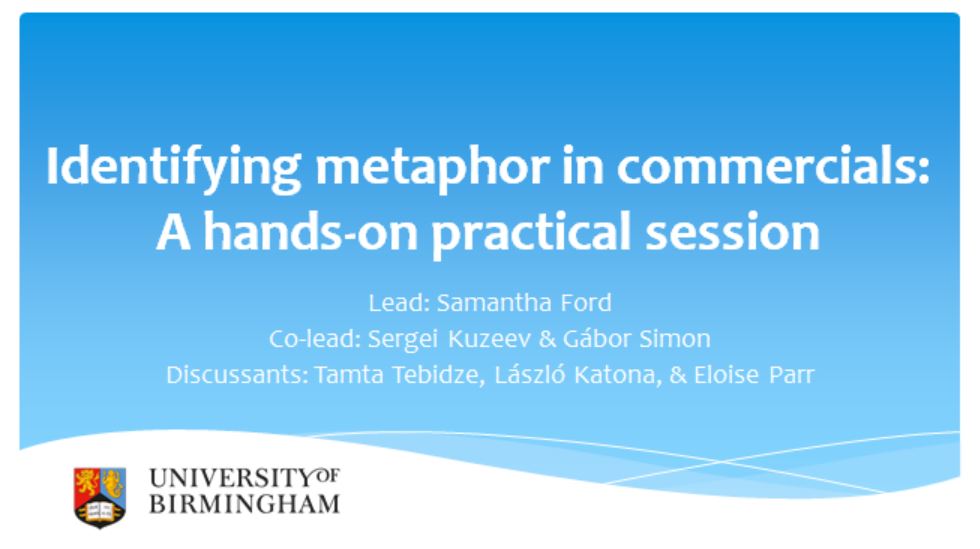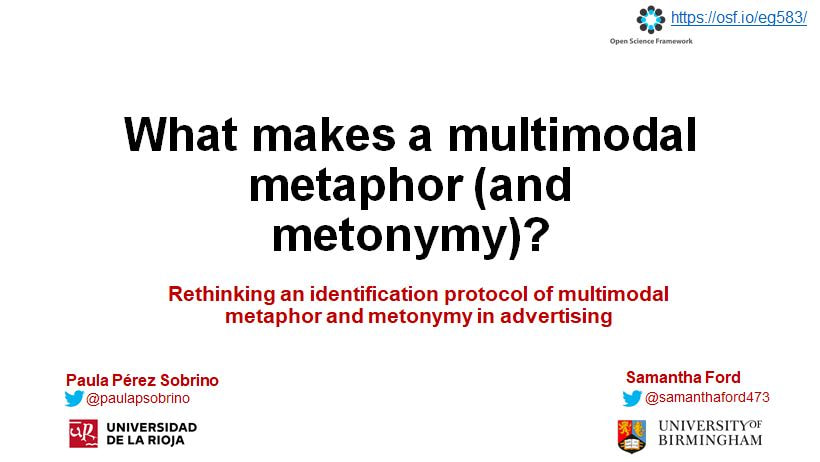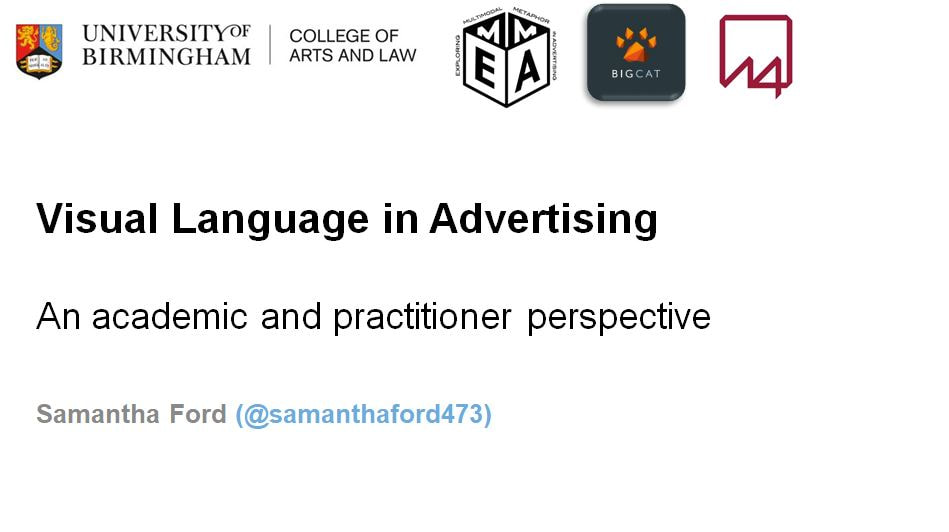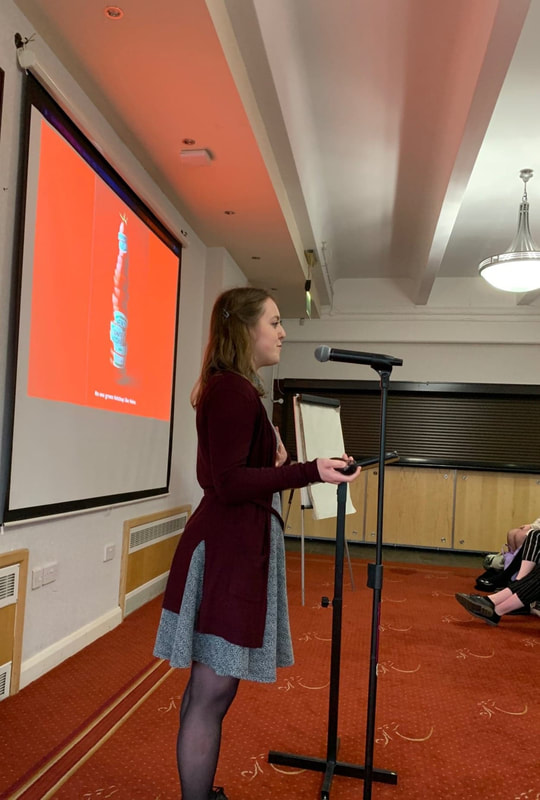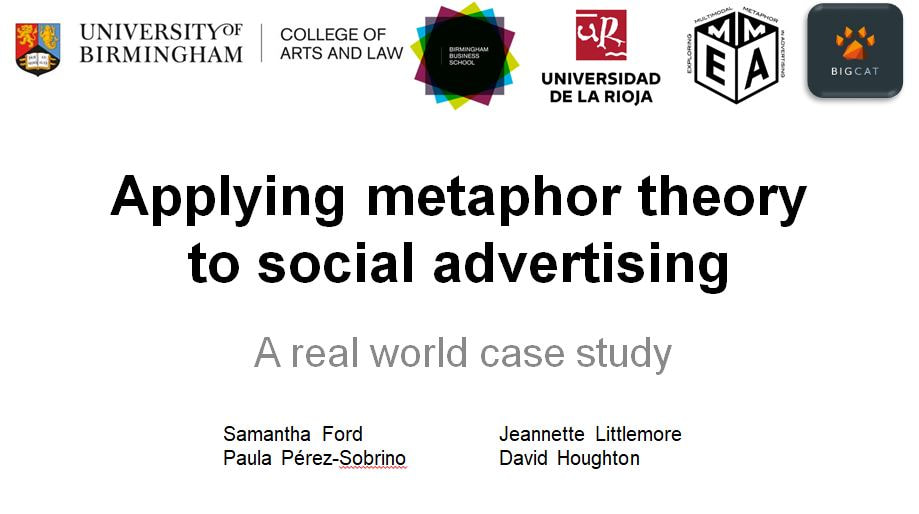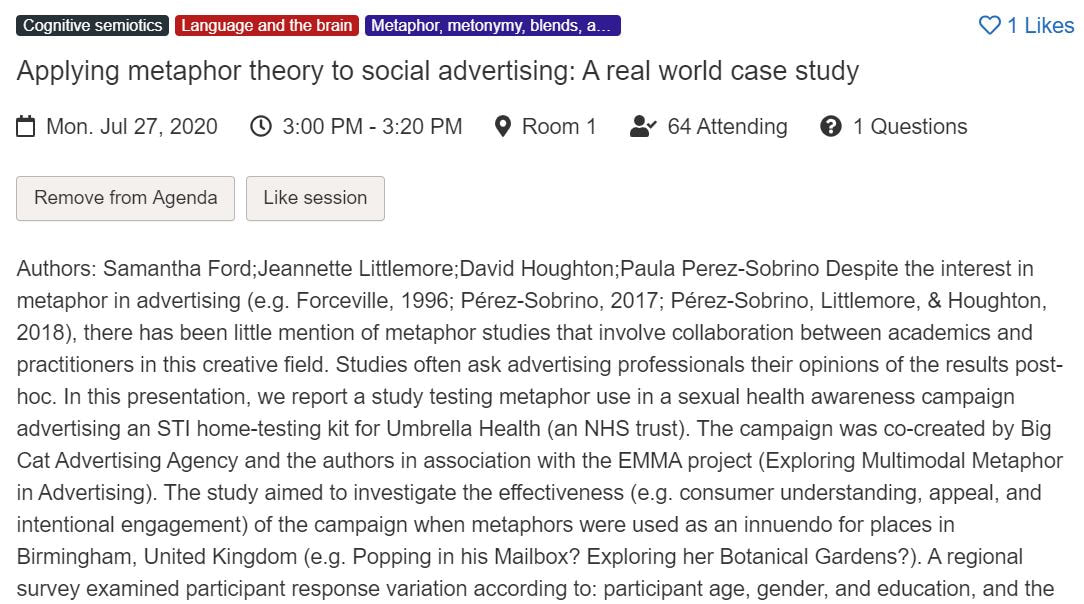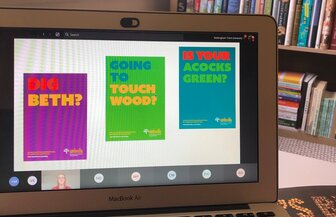I presented in the panel session: Health & Wellbeing: Reimagining community mental health provisions. Abstract Taking responsibility: The power of figurative communication in sports advertising and its role in tackling social issues of equality and mental health
0 Comments
Are you a PhD student/ECR doing language-based research on a topic which may be considered 'sensitive' or 'taboo'? We (Sarah Turner, Jeannette Littlemore, and Samantha Ford) would love to see you at our Midlands4Cities-funded Dialogue Day! Final couple of days to register. For more info: https://bit.ly/37LOt0x
If you've already signed up for this symposium, don't forget to choose which breakout rooms you want to go to speak to relevant funders and stakeholders about applying your research. Make sure to let us know! You can also send us a poster about your research for feedback. We look forward to seeing you on Friday!
Exploring the use and evolution of figurative tropes in health and fitness brands’ advertising prior to and during the COVID-19 crisis The COVID-19 pandemic and national lockdowns have restricted people’s mobility and health, having serious and long-term implications for the £8 billion health and fitness industry. I report findings from multiple studies that investigate the use of figurative tropes, specifically metaphor and metonymy, in health and fitness brands’ advertising: in health and fitness smartphone app icons (2018), in respondents’ written reactions to exercise and lifestyle before (2019) and during and after the UK national lockdown (2020), and in a multimodal corpus analysis of health and fitness brands’ advertising from award-winning campaigns before and during the COVID-19 crisis (2020-2022).
In this talk, I track the use of figurative tropes in health and fitness advertising, exploring two research questions: 1. How do health and fitness brands use figurative tropes in their advertising? 2. Has the use of figurative tropes evolved during the COVID-19 crisis? The 2018 study analysed the figurative use of colour and shape 50 health and fitness smartphone app icons from the Google Play Store using an adapted protocol from Beasley and Danesi (2010). The 2019 and 2020 studies were conducted in collaboration with Big Cat Advertising Agency as market research to understand how people (N = 75, N = 68 respectively) perceived exercise and their lifestyle before, during, and after the first UK national lockdown, using AntConc (Anthony, 2019) and WMatrix (Rayson, 2009) software for keyword and semantic domain analysis. The 2021-2022 study (in preparation) examines the use of metaphor in health and fitness brands’ campaign videos that have been awarded a Grand Prix award at the Cannes Lions Festival of Creativity for their effectiveness, using a procedure adapted from FILMIP (Bort-Mir, 2019), C-MIPVA (Pan & Tay, 2020), and Bordwell et al.(2016). This study aims to establish how successful health and fitness brands use figurative tropes effectively, and to track how this usage may have evolved during the pandemic. Findings show that people have physical and emotional reactions to health and fitness brands, and highlight the increasing importance of mental as well as physical strength before and during the pandemic, utilising metaphors that are embodied and symbolic. The finding from the studies presented in this talk will inform approaches for health and fitness brands (including gym, clothing, supplement, tech, and training) to appeal to their ‘new normal’ audience through the effective use of figurative tropes, and to support the nation’s physical health and mental wellbeing during this time of crisis. References Anthony, L. (2019). AntConc (3.5.8) [Computer software]. Waseda University. https://www.laurenceanthony.net/software. Beasley, R., & Danesi, M. (2010). Persuasive signs: The semiotics of advertising (Vol. 4). Walter de Gruyter. Bordwell, D., Thompson, K., & Smith, J. (2016). Film art: An introduction (11th ed.). McGraw-Hill Education: New York, NY, USA. https://www.vlebooks.com/vleweb/Product/Index/1993344?page=0 Bort-Mir, L. (2019). Developing, applying, and testing FILMIP: The Filmic Metaphor Identification Procedure [Universitat Jaume I]. 10.13140/RG.2.2.18345.03688 Pan, M. X., & Tay, D. (2020). Identifying creative metaphor in video ads. In K. L. LIN, I. N. Mwinlaaru, & D. Tay (Eds.), Approaches to specialized genres: In memory of Stephen Evans (pp. 216–240). Routledge. Rayson, P. (2009). Wmatrix: A Web-Based Corpus Processing Environment. Computing Department, Lancaster University. DOI: 10.1.1.28.8248 Today I led a hands-on workshop on identifying metaphor in multimodal commercials using a presentation and breakout rooms at the Birmingham-Budapest Doctoral Seminar, 13.45-15.15 BST. The day was organised by Jeannette Littlemore and Rita Brdar-Szabó, and aimed to provide a forum for doctoral students studying at the universities of Birmingham and Budapest to share ideas and troubleshoot issues regarding methodology. The seminar hosted plenaries Dennis Tay and Asifa Majid, and many fascinating PhD talks. Thank you to everyone who came to my workshop at the Birmingham-Budapest Seminar! It was great to hear that delegates enjoyed analysing Evian water advertisements using FILMIP (the Filmic Metaphor Identification Procedure developed by Lorena Bort-Mir, 2019) and C-MIPVA (Creative Metaphor Identification Procedure in Video Ads developed by Pan & Tay, 2020). View the abstract for the workshop below:
At the beginning of the 2020 academic year, I volunteered to run PG Tips with Stephen Appleton. PG Tips is a postgraduate group for postgraduate researchers based in the Department of English Language and Linguistics at the University of Birmingham. It was tradition that PG Tips host the annual Birmingham English Language Postgraduate Conference. Due to the Coronavirus pandemic outbreak in the UK forcing us into lockdown in March 2020, the BELP Conference was unable to go ahead that year.
Since then, however, PG Tips has been continuing to run online via the conference platform Zoom, developing the postgraduate researcher community in the department, with students tuning in from different countries across the world. With the support of technology and experience of conferences shifting online, Stephen and I strongly believed in the benefit of running the BELP Conference in the year 2021. Moving from initial planning stages with Stephen, and with the help of many volunteers from the postgraduate community, we were able to launch the conference; to take place on Friday 23rd April 2021. It has been my great pleasure (and a lot of hard work!) to make BELP happen this year. I believe that community and collaboration is something integral not just to research but also to our human nature, which we need to facilitate and nurture at every opportunity. The conference welcomes postgraduate researchers and taught postgraduates to attend and present their work and engage in academic discussion. I am also delighted to invite and welcome distance-learning students and undergraduates to attend the conference. The conference has a diverse range of sessions, from plenary speaker Viola Wiegand talking about (corpus) linguistics and open research, to a round table panel discussion with Ashley Blake, Nouf Alharbi, and Bingjun Zhang talking about progressing with a PhD during COVID-19, to a variety of oral presentations and poster presentations from delegates. While I have led the organisation of the conference for 2021, I must acknowledge and give my sincere thanks and appreciation to volunteers from the postgraduate community in the department: Nouf Alharbi, Stephen Appleton, Ashley Blake, Sharon Glaas, Eloise Parr, Qiuyi Sun, Eleanor Vivian, Greg Woodin, Keith Wilson, and Bingjun Zhang; and Amélie Doche; and staff members: Joe Bennett, Marcus Perlman, and Viola Wiegand (BELP2021 plenary speaker). I hope all delegates of the conference enjoy the day and thank you all for your support of this event. The Birmingham English Language Postgraduate Conference - known as BELP - is an annual conference for Postgraduate students in English Language and Applied Linguistics. Since 1998, BELP has provided postgraduate researchers with a platform to present work and network with researchers in the fields of English Language and Applied Linguistics. The 2021 conference is entirely virtual, operating on the Zoom conferencing platform in order to be as inclusive as possible during the Coronavirus pandemic.
The BELP Conference 2021 registration is now open. The invitation to attend the conference extends to all PGs (research/taught) and UGs in the English Language and Linguistics department at the University of Birmingham. The conference will take place on Friday 23rd April 2021. Register here: https://belpconference2021.weebly.com/registration.html Programme (schedule & abstracts): https://belpconference2021.weebly.com/programme.html PGTips is now on Twitter and will be tweeting about the conference. I encourage conference delegates to follow the account @PGTipsUoB and to use the hashtag #BELP2021. More information about the conference can be found here: https://belpconference2021.weebly.com/. Most talks will be recorded and will be made accessible to delegates after the conference. There will be plenty of opportunity during the conference day to network and discuss research. See you there!
Citation:
Ford, S., Littlemore, J., & Pérez-Sobrino, P. (2020). Applying metaphor theory to social advertising: a real world case study. 5th International Virtual Conference on Figurative Thought and Language (Virtual FTL5), Sofia University, Bulgaria, 29th-31st October 2020. Virtual oral presentation.
|
Categories
All
Archives
October 2022
|
||||||||||||||||||
Photos from wuestenigel (CC BY 2.0), wuestenigel

